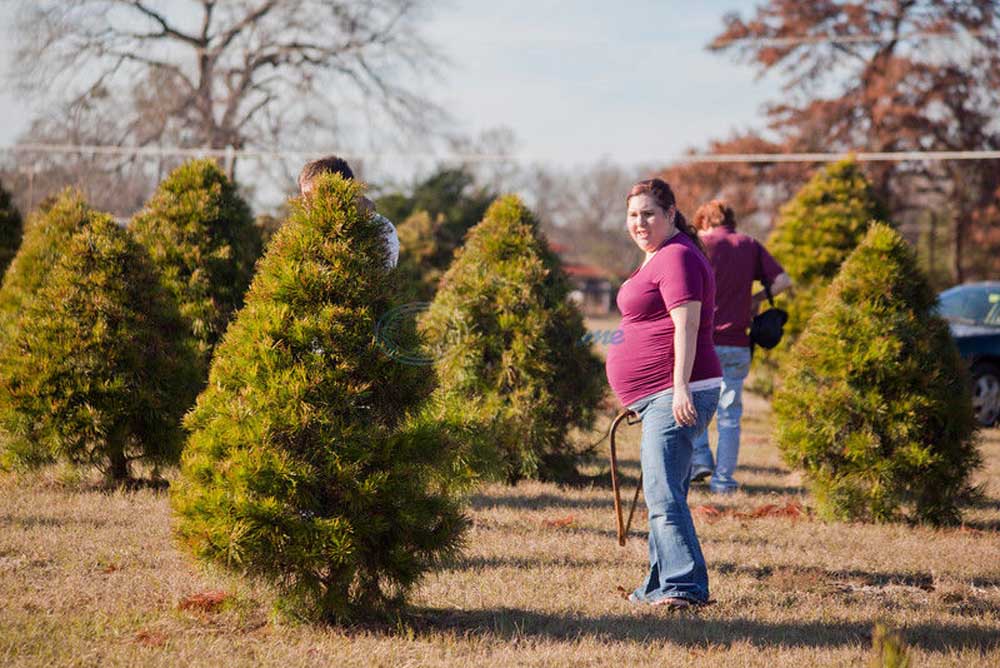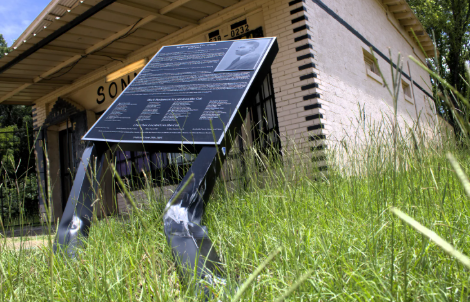Oldest Christmas tree farm in East Texas keeps customers coming back
Published 9:59 pm Sunday, December 14, 2014

- Photo by Haylee Bazil/Staff Photographer. On Saturday December 6, Stephani Blunt, looking for a Christmas tree at the Watson Christmas Tree Farm
Darrell Watson considers his Christmas tree farm business more of a ministry than anything.
“We’re trying to keep the tradition of Christ in Christmas. … To us, it’s celebrating our Lord’s birth,” he said.
Trending
Watson, 67, and his wife of 48 years, Glenda, moved to the 19-acre farm a few miles outside of New Chapel Hill in 1976. Watson started the business in 1983 to supplement his income, because working overtime at a plastic bag manufacturer just wasn’t enough.
“We’re the oldest (Christmas tree farm) in Smith County,” Mrs. Watson said. “That’s why we hate to let it go, because we like that title. We’re proud that people keep coming out and think of us enough to keep coming back.”
Most years, they’ve probably lost more money than they have made on the farm, Watson said. But it is about keeping the traditions going and seeing families have a good time and make memories, he added.
Watson recalls growing up on the land his father bought for $11 an acre more than 60 years ago. His father had cattle, hay, pigs, chickens, cotton, peanuts and other crops.
“His dream was making a living off the farm,” Watson said.
But like him, Watson’s dad had to have a job in town, and the farm was a side business.
Trending
Watson has been an insurance agent in Tyler for more than six years. He also has worked for a claims adjustor and a plastics manufacturer.
Mrs. Watson, 65, was a stay-at-home mom with their two young daughters and now helps run the tree business.
“After we started it, he made me the second wife and the trees the first wife, because they always came first,” Mrs. Watson joked.
The 19 acres consists of about 5 acres of trees, with up to 1,000 trees per acre.
They typically plant about 1,000 Virginia Pine trees a year and sell about 200 “if we’re lucky,” Mrs. Watson said.
Watson said business has been better than last year because of the good weather.
His wife said they try to close the farm the week before Christmas so they can get ready to celebrate the holiday with their family. “We try to keep our family the focus point and not let the trees completely take over,” she said.
YEAR-ROUND JOB
Watson doesn’t intend to plant any trees next year, as he usually does, because he still has a “pretty good inventory” of 2,000 to 3,000 trees on the farm.
In past years, after selling the last of the season’s trees in December, the Watsons plant the seedlings in January. The 1-foot seedlings come to them from the Lake Palestine area and are kept in water until Mrs. Watson trims the roots and plants them in holes Watson digs. It usually takes two or three days to plant 1,000 trees but depending on the weather, it could take two to three weeks, she said.
It takes five years for a seedling to become a tree worthy of decorating, and they can reach 12 feet or higher when they are 7 years old.
In April, they give the trees their first shearing, followed by a second trimming in September. Watson said shaping the trees is the hardest part and as he gets older, it gets more difficult for him. The farm also requires constant mowing.
They mow the tree fields like a lawn and don’t use drip irrigation so their farm is accessible for people in wheelchairs, he said, adding that they already have had three children with special needs come out this year to enjoy the farm.
Throughout the year, the trees are sprayed for insects. Colorant is used to make them greener, but customers have been asking for natural trees so they added nothing to them this year, Mrs. Watson said.
Christmas tree farms, like most farms, are susceptible to the weather.
During the harsh drought a few years ago, the couple lost the more than 1,000 trees they planted that year.
“That was so heartbreaking,” Mrs. Watson said.
She makes wreaths with greenery from some of the trees that won’t sell.
After the year’s customers have come and gone, they keep the ones that will make good Christmas trees the following year and cut out the ones that won’t. Some are picked up by fisherman to drop in lakes while others are burned.
To Mrs. Watson, each tree is like an individual child.
“You watch them grow,” she said, adding that it makes it hard to throw some of them away.
Although she can see rows of them outside her window, Mrs. Watson has always had one of the trees in her house during the holidays.
“It doesn’t seem like Christmas without it,” she said.
DYING BREED?
Mrs. Watson said their peak years were the first 15 years they were in business.
“Back then it was new, everybody was more into getting out and doing things,” she said.
When the economy started going down, people didn’t have the money for extra things like Christmas trees.
Sales have slacked off throughout the years.
When he joined the Texas Christmas Tree Growers Association in the 1980s, Watson said there were about 650 members, and now there are about 120.
He believes the industry has dwindled, because more people are buying fake trees, less people are celebrating Christmas because of “our culture” and many people who entered the industry when he did have been thinned from the herd after realizing how labor intensive it is.
Being raised on a farm, Watson expected it would be hard work but had false expectations of how much money he could make farming Christmas trees, he said.
“I’ve been able to make enough for us to keep the land, so we can pass it down to our children,” he said, adding that his granddaughter is “just crazy about it.”
Although some might consider Christmas tree farmers a dying breed, Mrs. Watson said there will be some who struggle but hang in there like they are doing.
She recalls a year where they made so little profit, they had a hamburger to celebrate the end of the season. “It’s not a get-rich scheme, but it’s the joy of seeing the families,” she said. “It’s something you’ve got to love to do.”
MAKING MEMORIES
When a customer comes for a tree, they are given a saw and a pole to measure. After they cut their tree down, the Watsons pick them up in a wagon and help load it in their car. “I give them cider, take their money and we stand around and talk a while,” Mrs. Watson said.
Families making memories at the farm makes her feel good about the business.
“It’s hard work for us but when we see families out here having a good time. … They’re building memories,” she said. “You can’t get that with a fake tree.”
The Watsons have seen a lot of longtime customers, including some who have been coming to the farm for more than 20 years. Watson said those customers are one of the biggest reasons they stay in the business.
“It’s the biggest thing we get out of it — seeing these people year after year,” Watson said.
They have had customers from as far away as Nacogdoches, Dallas, Louisiana and Georgia. They even had a 16-foot tall tree that ended up in the Texas Capitol in 1992, Watson said.
The Watsons don’t have any employees but get help from their daughter, granddaughter and son-in-law. Neither of their daughters is interested in taking over the business, but their 16-year-old granddaughter, Harley Williamson, calls it her farm.
“This is what she calls home,” Mrs. Watson said.
They still have the first tree she ever planted.
“She enjoys it out here, that’s what makes it worthwhile,” Mrs. Watson said. “We want to have something where our kids can come and have a place to live if they need to … the main thing is that they can have a place to call home.”
She hopes that one day she or another family member will take over the business.
Until then, the Watsons will keep the farm going as long as they can.
“As long as people keep coming, we can’t complain,” Mrs. Watson said.






